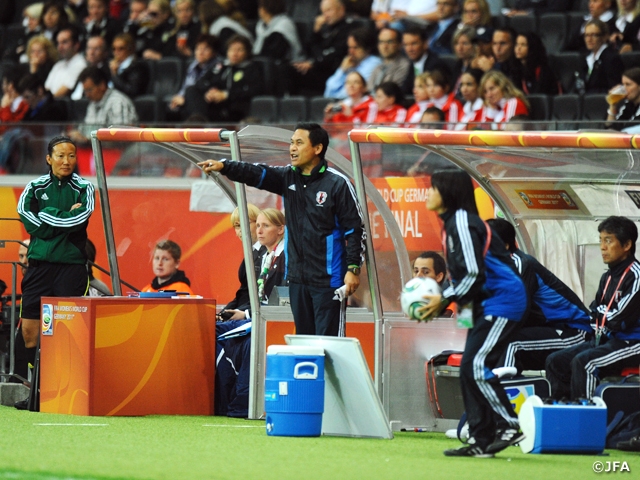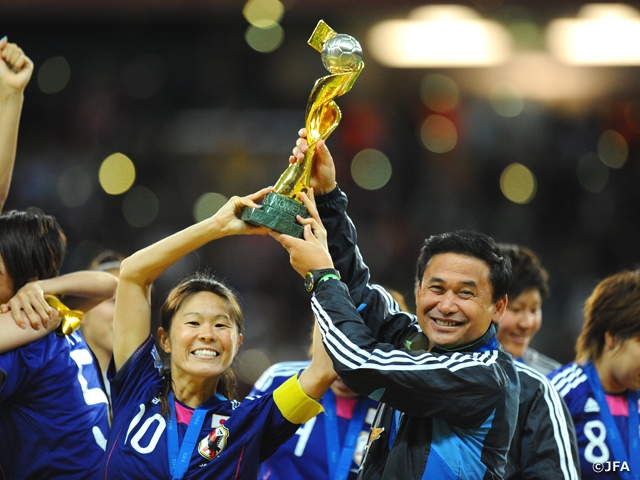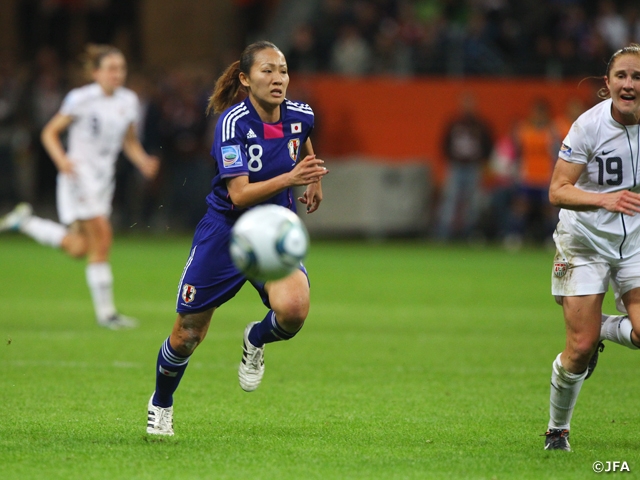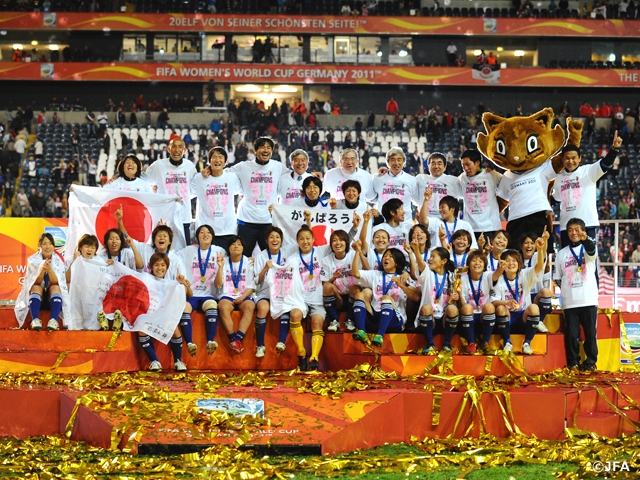NEWS
“Japan’s ability to reconstruct is the best in the world. Let’s bounce back from this adversity” 10 years since the Great East Japan Earthquake – Relay Column Vol.1
12 March 2021

It has been 10 years since the Great East Japan Earthquake. While the restoration has progressed with a ton of support from home and abroad, there is still a long way to go for a full recovery. Here we will deliver essays and columns of people involved in football, reflecting on their own experience and perspective on the Great East Japan Earthquake.
To start with, we will share the column of Mr. SASAKI Norio who led the Nadeshiko Japan (Japan Women’s National Team) as a coach to win the FIFA Women's World Cup 2011™.

The Great East Japan Earthquake struck on the day we made our return to Japan from Portugal, after playing in the Algarve Cup. I had lunch with players heading the same direction as I was, and I felt the shake when I got home. It was a tremendous shake. There were players heading towards Tokyo to take measurements for their suits, so I was more worried about them than any other. I remember being relieved after learning that those players were being helped by JFA.
For the time being, our priority was to check the social situation than to prepare for the FIFA Women's World Cup. Lots of thoughts crossed my mind as our future got clearer, and I just felt like I had to be fully committed. I had to be committed in preparing, planning, and leading the players to Germany in the best way possible.
“It was MARUYAMA Karina who made the most of the difficult time”
Ms. MARUYAMA Karina (who scored the deciding goal at the quarterfinals against Germany) was a player with great speed but lacked endurance. I always told her that she needed to do more training runs to build her stamina, but she never came through with it. At the time, she played for JEF United Ichihara Chiba Ladies, who weren’t able to use their training facility to its full capacity due to the earthquake, so their training menu mainly consisted conditioning workouts. In the past, she played for TEPCO Mareeze (suspended club activities before the 2011 season due to the earthquake). Knowing that her former teammates and people who supported her during her time with TEPCO were facing tough times, she must have been determined to “give back through football.”
I happened to come across a training match played by JEF United, and I saw Maruyama making multiple runs in a row, which suddenly made her a strong candidate for the Women’s World Cup squad. She showcased great performances at our USA tour and really made the most of that difficult time.

“Through football, we wanted to send a message to Japan while the country was struggling”
We were still able to play football despite the struggles of the entire country and the football family, so upon making our way to the Women’s World Cup, we really wanted to send a message to Japan through football.
We have seen miracles happen during difficult times in other sports. Orix did in baseball, and Yokohama Flugels did it at the J.League, so I told my players “Let’s turn this adversity into power.” With domestic leagues getting postponed and cancelled, our players were deeply affected in terms of game intuition, but if we could use that as motivation, we can still compete.
On the other hand, I also thought that seeing and hearing about the Great East Japan Earthquake would put excessive pressure on the players. The Nadeshiko Japan had a routine to watch motivational videos before each match, but for that reason, we avoided including footages of the earthquake. However, I wanted to include some of the footages before important matches, such as the quarterfinal match against Germany and the semi-final match, so I requested for videos of people from the affected areas making reconstruction efforts and how sports teams were working together at evacuation sites to help out the community. I think that each of the players themselves had their own thoughts and feelings about playing football while the country was struggling form the natural disaster.
“Japan’s ability to reconstruct is the best in the world. Let’s bounce back from this adversity”
The Nadeshiko Japan also held a charity match after winning the Women’s World Cup. There was a growing sense that the Nadeshiko Japan was a symbol of reconstruction, and many people who wanted to support the reconstruction work attended the charity match for that reason. I personally participated in football clinics at the affected areas and paid visit to evacuation sites. The reason I continued to make such efforts was because we received so many messages from the affected areas during the Women’s World Cup, when NHK asked for “Messages for the Nadeshiko Japan.” Their words of encouragement really helped us gain courage and energy during the tournament, so at that time, I felt that I had to pay them back once we return to Japan.
No one is at fault for causing the earthquake nor this corona pandemic. That is why we must accept the reality and move forward. Going back from the post-war period, Japan’s ability to reconstruct has been the best in the world. That is why we must stay confident, face the adversity, and bounce back from it. Let’s overcome this tough time together.

Latest News
-
National Teams
2025/06/28
【Match Report】Nadeshiko Japan Fall 1–3 to Spain

-
National Teams
2025/06/24
U-16 Japan National Team squad & schedule - China PR Tour: CFA PEACE CUP (7/1-9@Shenyang, China PR)

-
National Teams
2025/06/19
U-17 Japan Women's National Team squad & schedule - USA Tour (6/21-7/3@Kansas City, USA)

-
National Teams
2025/06/17
Nadeshiko Japan (Japan Women's National Team) squad & schedule - EAFF E-1 Football Championship 2025 Final Korea Republic (7/6-17@Korea Republic)

-
National Teams
2025/06/17
Nadeshiko Japan (Japan Women's National Team) squad & schedule - International Friendly Match vs Spain Women's National Team (6/27@Madrid, Spain)



